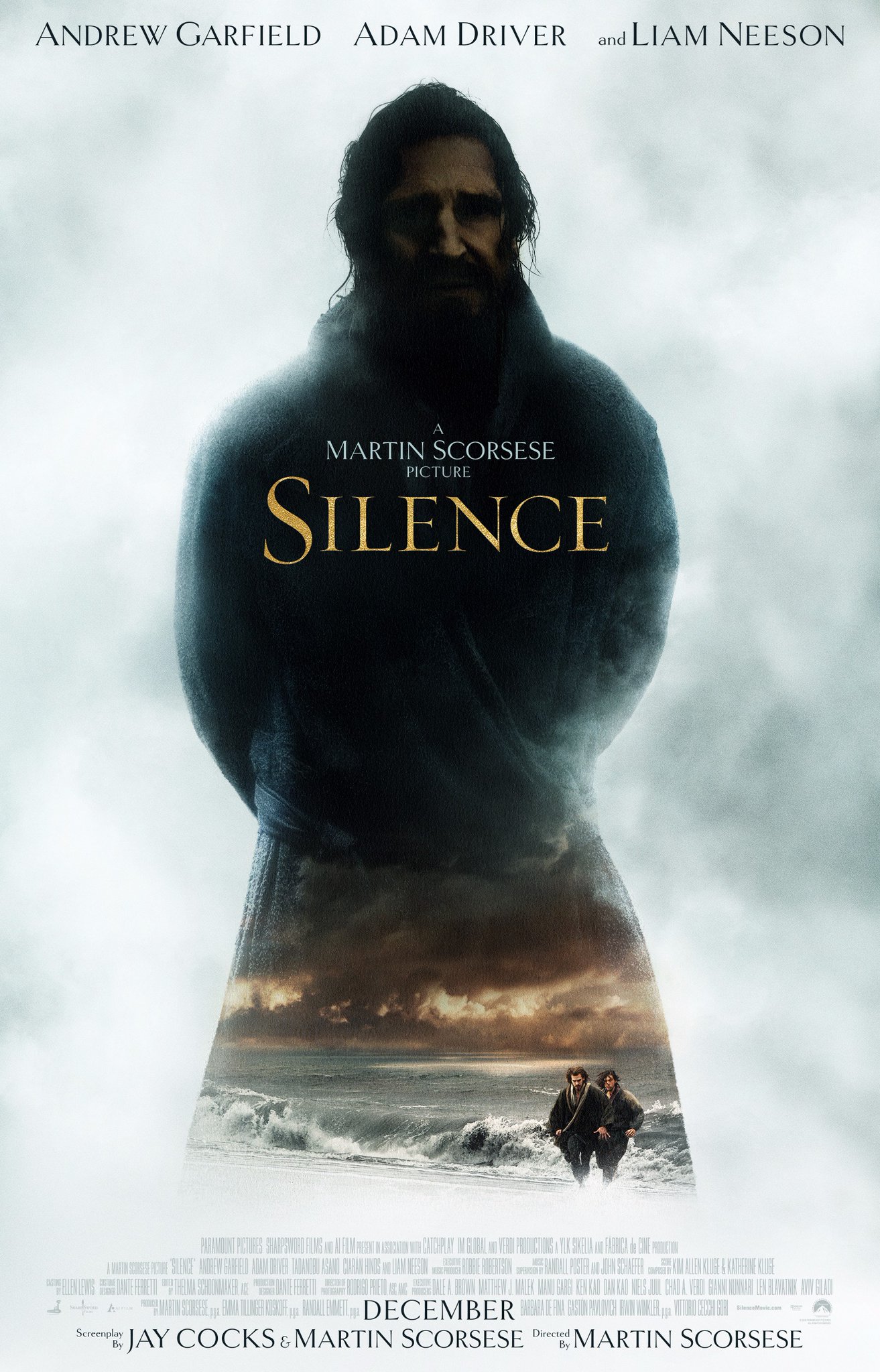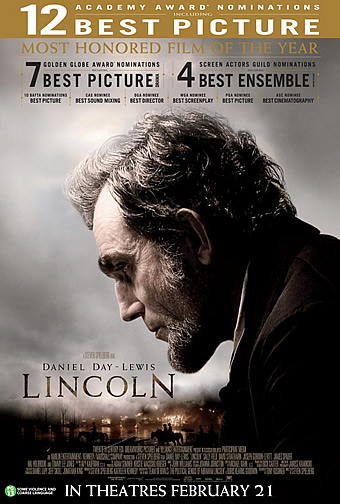SILENCE (2016)
Genre: Drama
Director: Martin Scorsese
Cast: Andrew Garfield, Adam Driver, Liam Neeson, Tadanobu Asano, Ciarán Hinds, Issei Ogata, Shin'ya Tsukamoto, Yoshi Oida, Yosuke Kubozuka
Runtime: 2 hrs 41 mins
Rating: NC16 (Violence)
Released By: Golden Village Pictures
Official Website: http://www.silencemovie.com
Opening Day: 9 February 2017
Synopsis: Martin Scorsese’s SILENCE tells the story of two Christian missionaries (Andrew Garfield and Adam Driver) who face the ultimate test of faith when they travel to Japan in search of their missing mentor (Liam Neeson) – at a time when Christianity was outlawed and their presence forbidden.
Movie Review:
Few directors today are bold or intellectual enough to engage in a serious discourse on the dogmas, riddles and anxieties of religious faith, which in itself makes ‘Silence’ notable. But Martin Scorcese’s adaptation of Shūsaku Endō’s revered 1966 novel isn’t distinguished simply by its rarity; oh no, the greater achievement here is in fact its remarkable depth and complexity, especially for believers of the Christian faith. Drawing no doubt from his own longtime relationship with the Catholic church (not only was he raised in a piously Catholic family, he had once considered becoming a priest), Scorcese approaches the material through his own perspective as a sincere but questioning Catholic, raising deep questions that admittedly at times assume too much of his viewers’ understanding and acceptance of Catholic doctrine.
Co-written with his ‘Gangs of New York’ screenwriter Jay Cocks, Scorcese uses the narrative as device to draw out the conundrums at the heart of his movie. Without going into too much detail therefore, the 17th-century set story revolves around two Portuguese Roman Catholic missionaries – Jesuit priests Father Sebastian Rodrigues (Andrew Garfield) and Father Francisco Garupe (Adam Driver) – who travel undercover to Japan to search for their missing teacher and mentor, Father Cristóvão Ferreira (Liam Neeson). Christianity had then been outlawed as Japan sought to close itself off from European colonial powers, and word was that Father Ferreira had done the unthinkable of apostasy. Upon landing on the Land of the Rising Sun, Father Rodrigues and Father Garupe find themselves welcomed with desperate adoration by devout peasants who cling onto their faith despite threat of torture, with the hope of entering paradise upon their death.
Yet theirs is no ordinary suffering – either rolled in straw mats and burned alive, or lashed to crosses and smashed by waves for days on end, or suspended upside down into pits with cuts above their ears that allow blood to drain drop by agonizing drop – so it is no wonder that witnessing these unspeakable acts shakes both priests to the core. Whereas Father Garupe remains unmoved in his faith, Father Rodrigues is left wavering – and not surprisingly, it is Father Rodrigues who becomes the film’s focus. Taken prisoner by the notorious inquisitor Inoue (Issey Ogata), Father Rodrigues is given the choice to end the suffering against his fellow Christians by committing apostasy himself – that is, stepping on a fumi-e, or a small plaque bearing the likeness of Christ. As Inoue explains earlier on when Father Rodrigues begs the former to take his life instead, his Japanese captors have since learnt that killing priests only ends up strengthening the faith of their believers.
Initially, as he is taught to do, Father Rodrigues turns to prayer, asking God to intercede for his faithful. When those prayers are met with apparent ‘silence’ from God, Father Rodrigues laments: “Why does God remain silent in the face of torment?” That is perhaps the most difficult leap of faith for all Christians, priests and lay people alike – if God is all-powerful, if He is a God of compassion and mercy, if He sent his only Son to deliver us out of suffering, why then does He allow His children to suffer such injustices? Father Rodrigues’ crisis of faith goes even further. Should he steadfastly uphold his faith, even if he means others will die? Or, given that he has the power, should he renounce Jesus publicly in order to save the lives of His innocent flock, while still holding God within his heart – after all, in Father Ferreira’s own words, ‘there are some things more important than the judgment of the Church’?
On a deeper, and perhaps even more fundamental level, Scorcese invites us to ponder on the very nature of faith, and by extension, the intention of proselytization. As easy as it may be to demonise the Japanese, Scorcese makes it clear that their drive to eradicate Christianity stems from their utter disdain of the European outsiders who have imported it into their lands, encroaching on their Buddhist beliefs with outright arrogance and even contempt. In the eyes of the Japanese, Christianity is simply antithetical, which itself begs the question of what end its proselytization seeks to accomplish in the first place. In claiming that ours is the true God, are we also saying that theirs are false Gods? Isn’t such moral superciliousness or superiority the reason why religious wars are fought? And didn’t Jesus himself tell his apostles in preaching the faith to ‘leave that home or town and shake the dust off their feet’ if anyone does not welcome them or listen to their words?
There are no easy answers here, and indeed it would be irresponsible for Scorcese to suggest otherwise. Though God shows the way, believers of any religion will probably agree that an individual’s faith journey has to be forged on his or her own to truly become one’s convictions – or else ending up like the film’s most frustrating yet human character, a Judas-like figure named Kichijiro (Yōsuke Kubozuka) who vacillates between apostasy and confession depending on which is more convenient at that point of time. At two hours and forty minutes, Scorcese’s ‘Silence’ may seem ponderously long, yet the filmmaker who hints at the start that this is nothing like his hyperactive ‘Wolf of Wall Street’ offers his viewers space, time and quietness to think about the difficult but significant questions within. There is both poetry and sublimity in Scorcese’s method, enhanced by stunning cinematography by the great Rodrigo Prieto in his use of light, shadow and colour.
It is no secret that this is Scorcese’s passion project, and the 28 years he has fought to bring the material to the big screen is itself reminiscent of a pilgrim’s journey. Some great actors who were once attached include Daniel Day-Lewis, Benicio del Toro and Gael Garcia Bernal, and one wonders if they would have been more compelling than Andrew Garfield is in the central role of Father Rodrigues. His is a performance searching for more gravitas and viscerality, sometimes outshone by that of his Japanese peers, including Yoshi Oida and Shinya Tsukamoto as two staunch Christian village elders, Tadanobu Asano as Rodrigues’ coolly menacing interpreter and Issey Ogata as the charmingly eccentric but viciously punishing inquisitor. Convenient as it may be to consider it as the completion of Scorcese’s unofficial trilogy on the subject of faith after ‘The Last Temptation of Christ’ and ‘Kunlun’, ‘Silence’ deserves to be recognized in its own right - a masterpiece complex, mesmerizing and immensely profound, and nothing less than the career summation of Scorcese’s legacy.
Movie Rating:





(One of Martin Scorcese’s best works, this complex, mesmerizing and profound exploration of the Christian faith that offers deep questions without easy answers is a thought-provoking but ultimately deeply rewarding watch)
Review by Gabriel Chong
You might also like:





